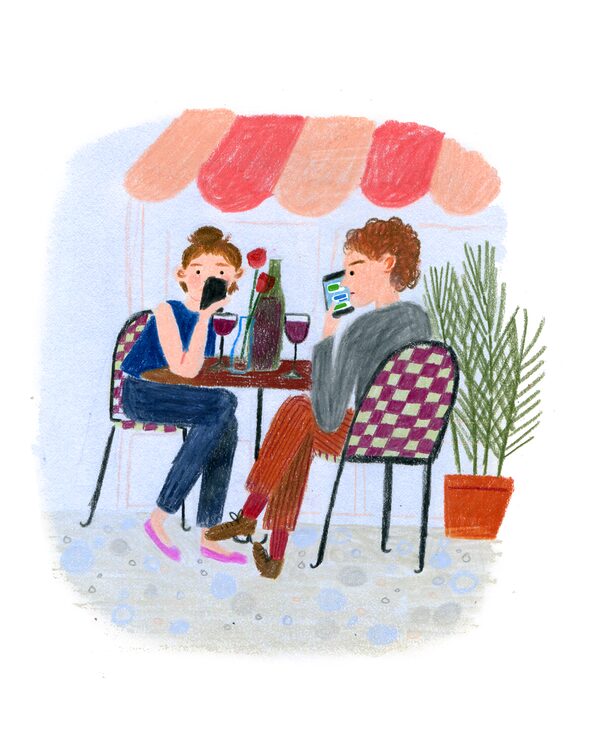
Illustration by Chelsea O'Byrne
First Person is a daily personal piece submitted by readers. Have a story to tell? See our guidelines at tgam.ca/essayguide.
There are three instances in my life when I have felt sick in love. The obsessive, horrible kind. Love that provides inexhaustible energy redeemable only for neurotic deliberation regarding the object of desire. Will they like this shirt? How do I orchestrate getting them alone? Why did I lie about liking Infinite Jest when I don’t even know the plot points?
These three instances of obsessive love all occurred when I was forced to put down my smartphone for more than 24 hours in the cell-service-less wild. I got bored. Boredom is an unusual state for a modern person to find themselves in because, well: internet.
Gone are the days of the peasant toiling in the fields who catches a fleeting glimpse of a princess and decides to dedicate the next 20 years of his life to becoming “the kind of man she could love.” Our lives are no longer occupied by the pursuit of food/shelter/occasional sex for procreation, and so we find meaning through art, friendships and marathons of Trailer Park Boys. How to stop humans from falling into a pit of boredom/existential doom? Give 'em a crush, and make it a hard one. But now that we have cell phones, we may have advanced beyond the need for amorous distractions. Replacing obsessive love with another form of illusionary intimacy: digital connection.
The first instance of obsessive love I encountered was in high school, presmartphone days. The second was in my mid-20s while working on a play with several other millennial actors. For five weeks, my romantic co-star and I had enjoyed requisite innocent flirting, and then we took the show on the road. For the first leg of the tour, our cast shared a cheap off-season ski chalet that had a hot tub, thin walls and no WiFi. Welcome to my perfect erotic nightmare. My carnal fixation on my co-star had led to several failed seduction attempts, demanding I pull out my aphrodisiac coup d’état. I do a very impressive retelling of The Ten Commandments. After a particularly lonely and horny glass of Muscadet in the hot tub, I retired to my thinly walled bedroom and listened for the nocturnal stirrings of my co-star. I caught him in the kitchen, poured us both gins and launched into an old testament re-enactment sure to lead to powerful intercourse. We discovered a mutual admiration for the 1956 Charlton Heston film version of The Ten Commandments and decided it was worth the data cost to stream with a hotspot connection. And so, thwarted by the intrusion of modernity, we never hooked up. I know what you’re thinking. Don’t blame the internet, blame Heston! But the demise of lust in this instance wasn’t latent Catholic guilt, it was diversion. A device we can blame for so many near consummations in the age of the iPhone.
The third and most recent instance of obsessive love happened to me this past summer when I found myself in the mountains of rural Japan working on a documentary. I was furious about the shoddy cell service, but at a certain point, I had to accept the disconnect. And then, tale as old as time, I fell in love. Sick in love. I was amazed at my mind’s natural ability to find something to occupy my time in the absence of a strong WiFi signal. The object of my desire had gone unnoticed by me for three weeks while we worked together in Kyoto, but here in the Japanese backwoods, her allure was monumental. I felt more alive than I had in years.
When I left Japan, I said goodbye with 15 different schemes running through my head on how I would get myself to Singapore, her home. My obsession burned for a few more weeks, now aided and abetted by being able to check if she had watched my Instagram story or liked my tweet. But then, ex-lovers started sliding into my DMs asking about Japan, I was getting really into a few Elon Musk parody Twitter accounts and I had months of podcasts to catch up on. These obsessions aren’t sustainable or built to last. They are the dying stars whose nuclear fuel momentarily blinds us to the mediocrity of existence.
Undoubtedly, smartphones do not mean the end of fulfilled mutual romantic love; human beings are too smart to replace that with a digital replica … for now. However, I wonder about the Catherines and Heathcliffs of Gen Z. Can Love in the Time of Cholera exist in the time of WhatsApp? The sterility of modern love is a well discussed contemporary tragedy, and the exquisite torture of misplaced, impossible or unrequited love may well be a thing of the past.
Among the plethora of critiques lobbed at millennials is my generation’s commitment aversion. We buy less houses, choose not to marry and have an impressive near 90-per-cent success rate when it comes to cancelling/rescheduling brunch plans. I give Twitter thrashings to boomer-written op-ed pieces calling millennials lazy, but the kernel of truth accompanying this propaganda is the suggestion that the iPhone generation is immune from becoming consumed by a singular goal. Obsession beats talent. Descartes had to sit in bed thinking for 11 hours a day to come up with the phrase “I think, therefore I am.” Today, I blast my ill-formed thoughts onto Twitter about Marie Kondo hoping to revolutionize the modern zeitgeist and crest at 196 likes, 11 retweets.
This summer, I am going on a whitewater canoe expedition on the Keele River in Canada’s Northwest Territories for two weeks. There will be no cellphone service, communal cooking over fires and the possibility of midnight rainbows in the North’s 24 hours of sunlight. I have Google stalked the tour guide extensively. Not my type. Thank God, I guess.
Karen Knox lives in Toronto